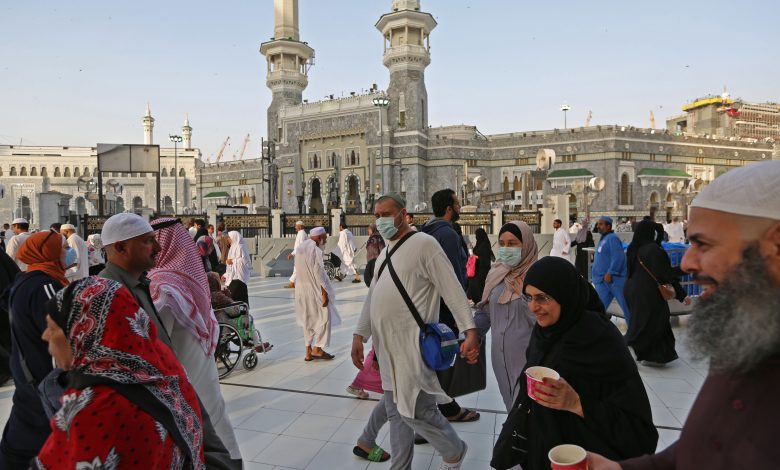Saudi Arabia announces $32 billion stimulus

[ad_1]
Muslim pilgrims wear masks at the Grand Mosque in Saudi Arabia’s holy city of Mecca on February 28, 2020. Saudi Arabia suspended visas for visits to Islam’s holiest sites for the “umrah” pilgrimage, an unprecedented move triggered by coronavirus fears that raises questions over the annual hajj.
ABDEL GHANI BASHIR | AFP | Getty Images
Saudi Arabia’s government unveiled stimulus measures amounting to 120 Saudi billion riyals ($32 billion) on Friday to support an economy hit by the double blow of the coronavirus crisis and dramatically lower oil prices.
The sum includes Riyadh’s 50 billion riyals package announced last week to support small and medium-sized businesses. Friday’s announcement introduces a further 70 billion riyals to aid businesses, including the postponement of tax payments and exemptions of various government levies and fees.
Earlier this week, the kingdom cut its 2020 budget by almost 5%, a step that many economists predict will be the first of a series of cutbacks and potentially even austerity measures to keep its finances intact amid oil prices plunging by nearly 60% year-to-date.
The relief measures in the new stimulus package include exemptions on expat levies, postponing some private sector fee payments to the government, and postponing the collection of customs duties on imports. It also allows employers to extend exit and re-entry visas free of charge for three months and enables businesses to postpone paying value-added tax, income tax and other levies for the next three months.
“Some budget appropriations will be reviewed and reallocated to the sectors most in need in the current situation, including allocating additional funds to the health sector as needed,” the statement quoted Finance Minister Mohammed al-Jadaan as saying.
“An emergency budget was also introduced to cover any costs that may arise during the developments of this global crisis.”
Saudi Arabia has taken sweeping measures to stem the spread of the coronavirus, including suspending numerous flight routes and temporarily halting entries for religious pilgrims coming to the kingdom for Hajj, a journey taken by some two million Muslims annually.
Oil price plunge and hit to fiscal plans
Riyadh earlier this month set off an oil price war, slashing its prices to buyers, and plans to increase its oil production from a recent 9.7 million barrels per day (bpd) to 12.3 million bpd in a strategy to increase its market share. This, coupled with crushed demand from the coronavirus, could plunge crude prices into the teens, analysts say. International benchmark Brent crude was trading at $28.28 a barrel on Friday at 12:40 p.m. ET.
Saudi Arabia needs oil priced at $82 per barrel to balance its budget, according to the International Monetary Fund — “which means Riyadh’s fiscal plans and the Saudi economy will suffer a big blow,” a report from Energy Intelligence wrote this week. The analysis firm predicts the kingdom’s flagship Vision 2030 economic reform plan will suffer a significant setback as well.
The government statement Friday quoted al-Jadaan as emphasizing that “the government has considerable ability to diversify sources of financing between public debt and government reserves to adequately tackle the emerging challenges.”
Options for the kingdom, analysts say, include implementing more cuts, further borrowing, selling assets from the Public Investment Fund, pulling cash from overseas projects, or accessing its foreign cash reserves — with a more drastic option being austerity.
While the dive in oil prices since early March is negative for Saudi Arabia, there may be a silver lining, Ehsan Khoman of MUFG Bank said this week in a research note. This would come in the form of significantly higher oil production growth from April onward. The bank predicts a recovery in oil prices in the second half of 2020 leading to oil revenues recovering from 2021 onward.
“Indeed, increases in oil output will have a mechanical impact on real GDP (gross domestic product) growth via higher volume of production in the oil sector, and thus boosting considerably oil GDP growth,” Khoman said.
Source link






